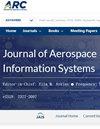Attitude Takeover Control of Failed Spacecraft via Leader–Followers Adaptive Cooperative Game
IF 1.5
4区 工程技术
Q2 ENGINEERING, AEROSPACE
引用次数: 0
Abstract
In this paper, the problem of microsatellites-based adaptive cooperative game attitude takeover control for a failed spacecraft is investigated. Specifically, a manned microsatellite (leader) and a team of autonomous microsatellites (followers) are ordered to cooperate to complete the attitude control task in an optimal way, in which the control strategy and the cost function (or intent) of the leader are unknown to the followers. Based on the differential game (DG) theory, the microsatellites-based attitude takeover control problem is formulated as a cooperative DG, in which each microsatellite has the individual cost function. A key problem is that the followers must infer the leader’s intent first, that is, retrieve the weighting matrix of the cost function of the leader. To achieve this, a composite adaptive law is introduced for each follower to estimate the feedback gain matrix of the leader by using system state data and the cost functions of other followers; based on this, the leader’s intent is inferred online by minimizing a residual error. Then, the cooperative game control law of each follower is designed by itself, and the Pareto equilibrium of the DG system is achieved. Finally, the effectiveness of the proposed leader–followers adaptive cooperative game control method is verified by a simulation study.基于领导-追随者自适应合作博弈的失效航天器姿态接管控制
研究了失效航天器下基于微卫星的自适应协同博弈姿态接管控制问题。具体来说,一个载人微卫星(领导者)和一个自主微卫星(追随者)团队被命令以最优方式合作完成姿态控制任务,其中领导者的控制策略和成本函数(或意图)是被追随者不知道的。基于微分对策(DG)理论,将基于微卫星的姿态接管控制问题表述为一个合作DG,其中每个微卫星都有各自的代价函数。一个关键的问题是,追随者必须首先推断领导者的意图,即检索领导者成本函数的权重矩阵。为此,对每个follower引入复合自适应律,利用系统状态数据和其他follower的代价函数估计leader的反馈增益矩阵;在此基础上,通过最小化残差在线推断领导者的意图。然后,自行设计各follower的合作博弈控制律,实现DG系统的Pareto均衡。最后,通过仿真研究验证了所提出的领导-追随者自适应合作博弈控制方法的有效性。
本文章由计算机程序翻译,如有差异,请以英文原文为准。
求助全文
约1分钟内获得全文
求助全文
来源期刊

Journal of Aerospace Information Systems
ENGINEERING, AEROSPACE-
CiteScore
3.70
自引率
13.30%
发文量
58
审稿时长
>12 weeks
期刊介绍:
This Journal is devoted to the dissemination of original archival research papers describing new theoretical developments, novel applications, and case studies regarding advances in aerospace computing, information, and networks and communication systems that address aerospace-specific issues. Issues related to signal processing, electromagnetics, antenna theory, and the basic networking hardware transmission technologies of a network are not within the scope of this journal. Topics include aerospace systems and software engineering; verification and validation of embedded systems; the field known as ‘big data,’ data analytics, machine learning, and knowledge management for aerospace systems; human-automation interaction and systems health management for aerospace systems. Applications of autonomous systems, systems engineering principles, and safety and mission assurance are of particular interest. The Journal also features Technical Notes that discuss particular technical innovations or applications in the topics described above. Papers are also sought that rigorously review the results of recent research developments. In addition to original research papers and reviews, the journal publishes articles that review books, conferences, social media, and new educational modes applicable to the scope of the Journal.
 求助内容:
求助内容: 应助结果提醒方式:
应助结果提醒方式:


